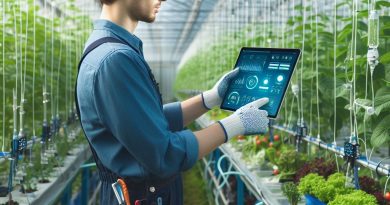Agri-Tech’s Role in Farm Diversification
Last Updated on January 31, 2024
Introduction
Agri-tech, including Agri Tech Role in Farm Diversification, harnesses technology to elevate agricultural productivity and efficiency.
Farm diversification is crucial in agriculture as it reduces reliance on a single income stream.
Agri-tech plays a significant role in farm diversification by providing innovative solutions to farming challenges.
Technology enables farmers to explore new markets and adopt alternative farming practices.
Agri-tech helps farmers in diversifying their income sources and mitigating risks associated with traditional farming methods.
Advanced tools and technologies facilitate the production of high-value crops and livestock products.
Farmers can utilize precision farming techniques and smart devices to optimize resource management and increase yields.
Agri-tech also enables farmers to explore non-traditional ventures like agro-tourism and value-added products.
Diversification through agri-tech opens up opportunities for rural communities, leading to economic growth and job creation.
Moreover, technology-driven farm diversification promotes sustainable practices and conservation of natural resources.
In fact, agri-tech plays a vital role in farm diversification by providing innovative solutions and opening up new avenues for farmers.
Read: Revolutionize Farming with Digital Marketing
Benefits of Agri-Tech in Farm Diversification
Improved efficiency and productivity
Agri-tech plays a crucial role in farm diversification by offering numerous benefits to farmers.
By embracing agri-tech solutions, farmers can significantly enhance their efficiency and productivity.
One of the key advantages of agri-tech in farm diversification is the introduction of precision agriculture.
Farmers can now use technology to meticulously analyze and optimize their farming practices.
Through the use of data, they can determine the ideal amount of inputs required for crops, minimizing waste and maximizing yields.
Furthermore, the integration of smart devices and equipment has revolutionized farming operations.
Sensors help monitor soil conditions, humidity levels, and crop health, providing real-time data that enables farmers to make timely decisions.
Automated machinery and drones have also eased labor-intensive tasks, saving time and increasing operational efficiency.
The availability of data-driven decision making empowers farmers to make informed choices.
By analyzing real-time information, farmers can identify trends, anticipate potential challenges, and optimize their farming practices accordingly.
This leads to improved productivity and ultimately higher profits for diversified farms.
Expansion of product range
In terms of product range expansion, agri-tech plays a vital role in enabling farmers to embrace novel agricultural practices.
Techniques like hydroponics and vertical farming allow farmers to grow a wide variety of crops, regardless of land constraints.
By diversifying their crop selection, farmers can cater to various market demands and mitigate risks associated with relying on just a few products.
Agri-tech also enables farmers to incorporate value-added products into their operations.
With the help of technology, raw materials can be processed and transformed into higher-value goods such as juices, jams, or specialty items.
This opens up new market opportunities and revenue streams for farmers.
Minimizing environmental impact
Apart from economic benefits, agri-tech contributes to minimizing the environmental impact of farming practices.
By adopting sustainable farming methods, farmers can reduce their reliance on chemicals, limit soil erosion, and prevent water pollution.
Agri-tech solutions provide insights into the health of crops, allowing farmers to apply precise amounts of fertilizers or pesticides, leading to environment-friendly farming practices.
Resource consumption is another critical aspect where agri-tech can help.
Precision irrigation systems enable farmers to calculate the exact water requirements of crops, minimizing water wastage.
Efficient energy usage through automated machinery and sensors further reduces resource consumption, making farming operations more sustainable in the long run.
Lastly, agri-tech supports the promotion of biodiversity in diversified farms.
By leveraging technology, farmers can create habitats that support wildlife and beneficial insects, ensuring a healthy and balanced ecosystem.
This not only enhances the sustainability of farms but also contributes to the overall well-being of the environment.
In short, agri-tech offers significant advantages to farmers in terms of efficiency, productivity, and environmental sustainability.
It enables the expansion of product ranges and opens up new revenue streams.
By embracing agri-tech solutions, farmers can successfully diversify their farms and adapt to ever-changing market demands.
Read: Boost Sales: Digital Marketing in Agri World

Examples of Agri-Tech in Farm Diversification
Vertical farming
Agri-tech is revolutionizing farm diversification with innovative solutions like vertical farming.
By utilizing vertical space and controlled-environment agriculture, farmers can increase crop yield and diversify their produce.
This modern farming technique allows for year-round production and reduces water usage, making it an environmentally sustainable option.
Additionally, urban farming practices play a crucial role in meeting local food demands.
By utilizing small spaces in urban areas, including rooftops and vertical gardens, farmers can grow fresh produce in the heart of the city.
Hydroponics and aquaponics, which are soilless cultivation methods, are commonly used in urban farming to conserve water and maximize production.
The proximity of urban farms to consumers also reduces food miles and promotes food security.
Precision livestock farming
Another agri-tech innovation, precision livestock farming, is changing the way livestock is managed.
This approach involves monitoring and managing individual animals using technology.
Sensors and monitoring systems collect data on animal health, behavior, and performance, providing valuable insights to farmers.
This data-driven approach helps in early disease detection, targeted nutrition, and optimizing resource management.
By enhancing animal welfare and optimizing production, precision livestock farming contributes to sustainable and efficient farming practices.
The integration of agri-tech in farm diversification opens up new opportunities for farmers to expand their agricultural activities and increase profitability.
These examples of agri-tech showcase how technology can revolutionize traditional farming methods and foster sustainable practices.
By embracing these innovations, farmers can diversify their crops, meet local food demands, and ensure the welfare of their livestock.
Agri-tech is transforming the agricultural landscape, making it more resilient, efficient, and environmentally friendly.
Read: Emerging Markets in Agriculture
Challenges and Considerations
Agri-tech has the potential to revolutionize the way farms operate, enabling farmers to diversify their income streams and increase their sustainability.
However, there are several challenges and considerations that farmers need to address when incorporating agri-tech into their operations.
Initial investment costs
A major challenge is the initial investment costs associated with implementing agri-tech solutions.
Farmers often face financial constraints and may find it difficult to afford the necessary technologies and equipment.
This can hinder their ability to take full advantage of the potential benefits of agri-tech.
To overcome this challenge, it is crucial for farmers to explore potential financing options and seek government support and grants specifically designed to facilitate the adoption of agri-tech.
Technical skills and knowledge
In addition to financial constraints, farmers also need to possess the technical skills and knowledge required to effectively utilize agri-tech.
The rapidly evolving nature of technology means that farmers need ongoing training and education to stay updated and make the most of the available tools.
Encouraging partnerships and collaboration between farmers, agri-tech companies, and educational institutions can help bridge the knowledge gap and ensure farmers have access to the necessary expertise.
Market demand and consumer acceptance
Furthermore, market demand and consumer acceptance play a significant role in the success of farm diversification through agri-tech.
Farmers need to carefully assess market viability for new products before investing in the necessary technologies.
Conducting market research and understanding consumer preferences can help farmers identify niche markets and tailor their diversified farming projects accordingly.
Additionally, educating consumers about the benefits of diversified farming and agri-tech can help increase consumer acceptance and drive demand for these products.
Overall, while agri-tech holds great potential for farm diversification, there are various challenges that farmers need to tackle.
From initial investment costs and financial constraints to technical skills and market demand, addressing these considerations is essential for successful implementation.
By seeking government support, investing in training and education, and understanding market dynamics, farmers can overcome these challenges and harness the benefits offered by agri-tech in diversifying their farming operations.
Read: Cost Reduction in Farming
Conclusion
Agri-tech propels farm diversification, fostering resilience in agriculture.
It optimizes yields, ensuring sustainability. The potential for agri-tech is vast, promising a revolution in farming practices.
Its integration empowers farmers, boosting efficiency and economic viability.
To embrace agri-tech is to embrace a sustainable future for agriculture. It’s not just a trend but a necessity.
The synergy between technology and agriculture holds the key to overcoming challenges.
Encouraging farmers to adopt agri-tech is pivotal in creating a robust and forward-thinking agricultural sector.
As we recap, agri-tech’s role is not merely augmentative; it’s transformative.
It navigates challenges, opens new horizons, and paves the way for a resilient, sustainable farming landscape.
Let’s champion the fusion of innovation and tradition, steering towards an era where agri-tech defines the future of agriculture, ensuring prosperity and food security for generations to come.


